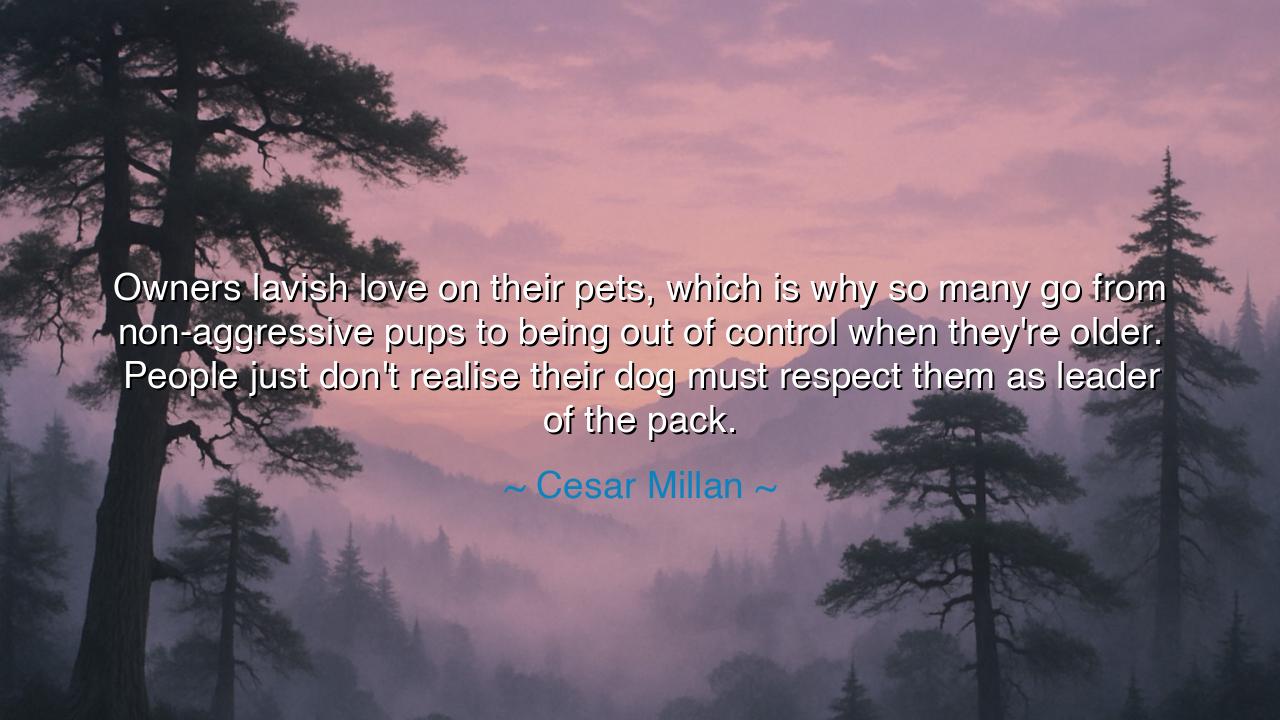
Owners lavish love on their pets, which is why so many go from
Owners lavish love on their pets, which is why so many go from non-aggressive pups to being out of control when they're older. People just don't realise their dog must respect them as leader of the pack.






The words of Cesar Millan—“Owners lavish love on their pets, which is why so many go from non-aggressive pups to being out of control when they're older. People just don't realise their dog must respect them as leader of the pack”—speak not merely of animals, but of leadership, balance, and the nature of discipline itself. Though he speaks of dogs, Millan’s wisdom reaches far beyond the realm of training—it touches the very heart of human nature. His message is ancient: love without structure breeds chaos, and affection without guidance weakens both giver and receiver.
In the old ways, when humans first tamed the wolf, they did not conquer it through cruelty, nor spoil it through indulgence—they earned its trust through strength, calm, and consistency. The wolf, noble and instinctive, followed the leader not because of domination, but because of respect. This sacred bond between human and animal—this understanding of hierarchy and order—is what Millan seeks to remind us of in a world that has forgotten it. The modern pet owner, blinded by affection, showers love upon the animal but withholds direction. The result is confusion, not harmony. The dog, once calm and balanced, becomes anxious and unruly, for he no longer knows his place within the pack.
This truth is not new. The ancients knew that every relationship—between parent and child, ruler and citizen, teacher and student—must rest upon mutual respect guided by structure. Even love must be disciplined, for love that overflows without wisdom drowns the very thing it seeks to nurture. In the days of Sparta, a father who loved his son did not shelter him from challenge; he strengthened him through it. Likewise, a wise master loves his animal not through indulgence, but through guidance that grants security. A dog that respects his owner feels peace, for he knows who leads and who follows.
Consider the story of Alexander the Great and his dog, Peritas. It is said that Peritas accompanied Alexander into battle, fearless and loyal, attacking even the fiercest of enemies to defend his master. Yet this loyalty was not born of spoiling or softness—it was the product of deep mutual respect. Alexander’s commands were clear, his energy calm, his leadership firm. The dog followed not from fear, but from understanding. And in that bond between man and beast, we glimpse the same lesson Millan teaches: true love manifests not in pampering, but in the trust that comes from consistent, confident guidance.
When Millan says, “your dog must respect you as leader of the pack,” he reminds us that leadership is an act of service, not domination. The leader of a pack is calm, steadfast, and centered. He does not shout or rage; he commands through presence and energy. Dogs, like humans, read what is unspoken—they follow confidence, not chaos. A dog without leadership mirrors the energy of its human: anxious if the owner is uncertain, defiant if the owner is weak, aggressive if the owner is fearful. Thus, in training the dog, one trains oneself. The leash becomes a mirror of the soul.
There is also a deeper symbolism at play. The “dog” in Millan’s teaching can represent the instinctual self—the wild part of our nature that craves freedom but also needs boundaries. When we fail to discipline this part of ourselves, when we allow emotion to overrule order, our inner “pack” falls into disarray. The ancient Stoics taught this same truth: mastery of the self begins with command over impulse. To be the “leader of the pack” within one’s own soul is to bring harmony to the chaos of desire, fear, and anger. Thus, Millan’s philosophy becomes a metaphor for the eternal human struggle between heart and discipline, between love and law.
The lesson, then, is both practical and spiritual: love deeply, but lead wisely. Whether you are raising a child, guiding a team, or caring for a dog, remember that affection must walk hand in hand with authority. To give only love is to create dependency; to give only discipline is to create fear. The balance of the two is the path to harmony. Be calm, be consistent, be firm—but always from a place of compassion, not control. For the truest form of leadership is not the one that demands obedience, but the one that inspires trust.
So, my child, when you walk with your dog—or with your destiny—walk as a leader of calm heart and steady mind. Do not confuse indulgence with kindness, nor fear with respect. The world, like the animal, responds not to words, but to energy. Let yours be strong and serene, grounded and kind. For in guiding others with balance, whether they have four legs or two, you honor the oldest wisdom of all: that love, to endure, must be guided by order, and that respect, once earned, is the most faithful companion a soul can have.






AAdministratorAdministrator
Welcome, honored guests. Please leave a comment, we will respond soon